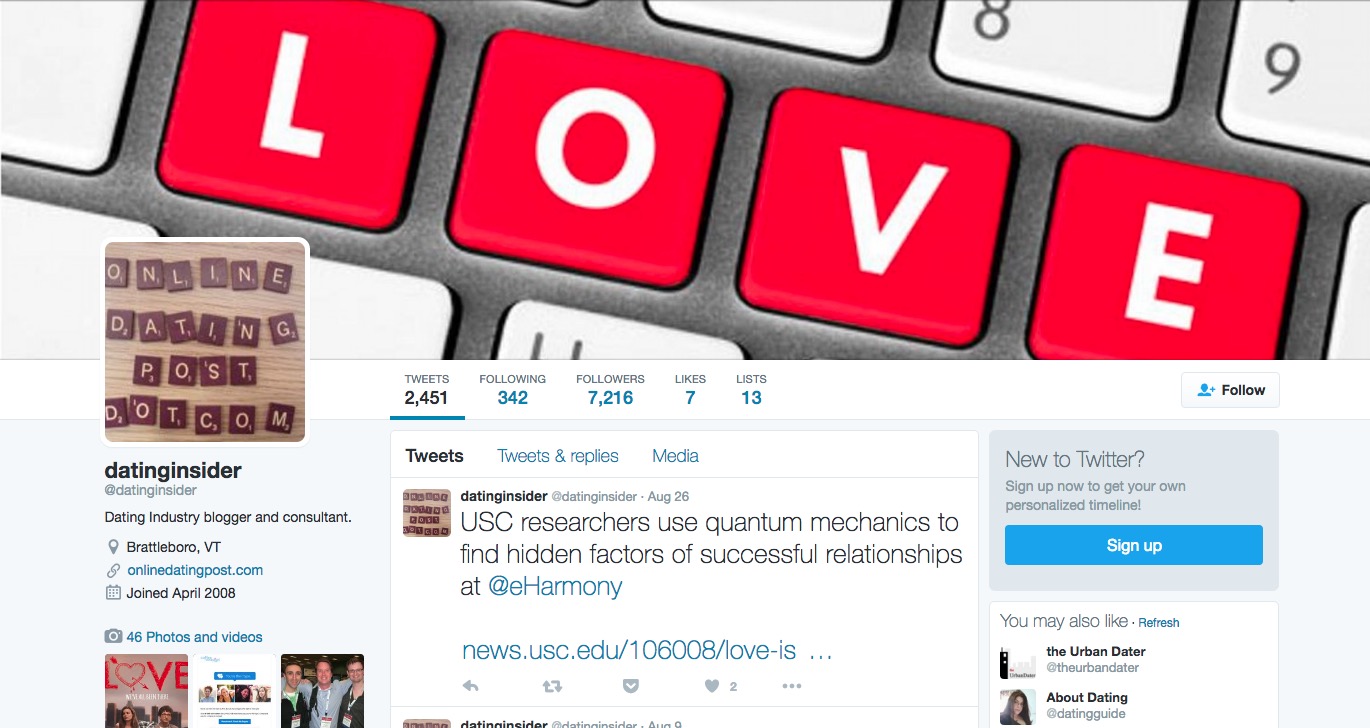New York Times has compiled a Latest Hits of online dating and relationship research. As with a new John Mayer or Coldplay album, with most dating research you already know what you’re going to get even before you dig into the data.
While somewhat enlightening, I’ve been listening to the same people say the same thing for a almost a decade now. The only difference is the nuance and surprise that researches tend to exhibit when it comes to the most basic stats that anyone who’s been on a dating site for more than a week would know.
I’d like to see a single research report that has led to innovation, increased efficiency a higher happiness quotient for dating site members.
I’m still waiting…
Major dating sites had more than 593 million visits in the United States last month. Now that gave me pause. That’s probably about 500 million for Match properties and the remainder spread around to The Niches.
Someone should do a study on the number of people who met their mate online and see what their happiness and divorce rates are. In particular, eHarmony, Plentyoffish (or do we call it POF now, I don’t get it.)
Here’s my favorite campaign-season stat. Let’s mine the most generic profile stats and pretend we are amazed that people’s politics actually makes a difference in picking a mate. Of course trotting out the only bi-party relationship in the world, James Carville and Mary Matalin. I vote that no one ever mentions those two again in regards to relationships ever again.
As far as I’m concerned, this is the most important finding in the article:
What people say they want in a mate and what qualities they actually seek don’t tend to correspond,” said Coye Cheshire, an associate professor at the School of Information at Berkeley who has studied this with Mr. Fiore, Professor Mendelsohn and Lindsay Shaw Taylor, a member of the school’s self, identity and relationships lab.
Finally, an interesting point is (re-)made, Bravo. This is a key point behind behavioral matching. What you think you want and what you actually need are often two totally different things. Dating sites like Match and OKCupid and POF get this, and are (one hopes) continuing to evolve their matching systems to take user behavior into consideration.
I find this absolutely fascinating and could talk about it all day. Unfortunately there are few people in the industry that a) believe and b) understand this stuff enough to put it into action on dating sites. And even less that want to have a beer and dig into the details.
If Zoosk made $100 million this year and they have the Zoosk matching system thats so powerful, then how come its not mentioned here?
Badoo reads this stuff and laughs. Matching systems, we don’t need to stinkin’ matching systems. Oops, we just billed your credit card another $25, enjoy talking to the 436,632 non-english speaking people (that aren’t really) in your area.
Everyone knows that dating profiles bring a bare minimum of insight into one’s personality. Where’s the fascinating research into facial coding, astrology, and a few other Big Important Useful things that would make online dating so much easier and effective? The resistance of the online dating industry to even express a modicum of interest in these ideas remains a sad point. If there was no Netflix prize, I doubt anyone would be doing behavioral matching in online dating at this time.
Look at how Google and Facebook innovate, each and every month. Go look at 10 niche dating sites. All owned by the same few companies, running the same 5-year-old templates, with seriously underpowered search engines. Now we’re going to go through niche site saturation, which is going to kill off a whole bunch of dating sites over the next few years, but that’s a story for another time.
The Times article goes on to say that The Journal of Communication used computer analysis to show that four linguistic indictors can help detect lying in the personal essay of a dating profile. I thought we had figured this out a long time ago? That’s what I was working on at Profile Doctor back in 2004.
Overweight and short people lie on dating sites all the time. The dating industry needs to stop talking about how people lie, take some pride and responsibility and do a better job creating more dynamic profiles that accurately reflect a person’s tastes and preferences, regardless of the teeth-grinding dullness they fill their profile essays with.
Why not offer verified photos and an identity check and remove the problem from the table? Oh wait, that hasn’t worked so far, let those fat short old people lie to their heart’s content. Ka-ching!
Researchers found a very high rate of same-ethnicity dating. Just like they did last year, and the year before that (They also found that people breath air). This is where (sadly) someone reading this is thinking, “ZOMG! I need to start a white-only niche dating site.” Actually that’s a great idea for the home-wreckers at Ashely Madi$on. Go for it guys, make us proud.
Thanks to our merry band of intrepid researchers and the NY Times, we know all too well what opaque (not our fault blame the dating site!) and sad liars online daters are (your truly included). Now its time to do something about it. I had no idea that I could go ask the National Science Foundation for a grant to do some research that actually improves online dating.
I wonder who’s press release kicked this story off?

